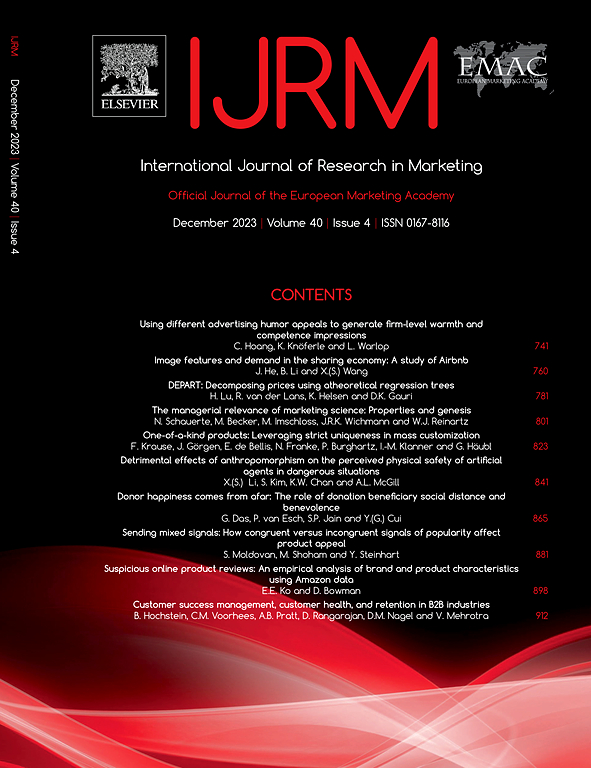When waiting makes sense: How consumer anticipation affects later evaluations
IF 7.5
2区 管理学
Q1 BUSINESS
International Journal of Research in Marketing
Pub Date : 2025-03-01
DOI:10.1016/j.ijresmar.2024.06.001
引用次数: 0
Abstract
This paper addresses a gap in knowledge about consumer anticipation. We build on the negative discount model (Loewenstein, 1987) which notes that utility may be gained through deferred consumption; the utility of looking forward to, and savoring forthcoming pleasant consumption adds to the total utility of the consumption episode. However, little is known about (1) the mental mechanisms involved in consumer anticipation, and their intensity, that underlie this effect, and (2) how evaluation of the object of anticipated consumption evolves over time, from the beginning of the anticipation period to post-consumption. Specifically, we ground our research in theories of attitude formation and change to investigate the circumstances in which evoking intense anticipation produces long-lasting and robust positive attitude.
From the literature, we develop hypotheses relating information provision and anticipation intensity to subsequent attitude change between pre- and post-consumption stages. We test hypotheses in five studies, in two cultural contexts involving pleasant anticipated consumption. We use an experimental approach manipulating real consumption experiences, recording attitudes pre- and post-consumption. We find that an “anticipation effect” on subsequent evaluations is explained by intensity of anticipation, which is driven by provision of information. We also note that a long-term desirable effect of anticipation is observed, irrespective of whether the core consumption experience was positive or negative.
何时等待才有意义:消费者的预期如何影响后来的评价
本文解决了关于消费者预期的知识差距。我们建立在负贴现模型(Loewenstein, 1987)的基础上,该模型指出,效用可以通过递延消费获得;期待和品味即将到来的愉快消费的效用增加了消费情节的总效用。然而,关于(1)涉及消费者预期的心理机制及其强度,构成这种影响的基础,以及(2)预期消费对象的评价如何随着时间的推移而演变,从预期期开始到消费后。具体地说,我们的研究立足于态度形成和改变的理论,以调查在何种情况下,唤起强烈的预期会产生持久而强健的积极态度。从文献中,我们提出了关于信息提供和预期强度对消费前后态度变化的假设。我们在两种涉及愉快预期消费的文化背景下测试了五项研究中的假设。我们使用实验方法操纵真实消费体验,记录消费前和消费后的态度。我们发现,对后续评价的“预期效应”可以用预期强度来解释,而预期强度是由信息提供驱动的。我们还注意到,无论核心消费体验是积极的还是消极的,都可以观察到预期的长期理想效果。
本文章由计算机程序翻译,如有差异,请以英文原文为准。
求助全文
约1分钟内获得全文
求助全文
来源期刊
CiteScore
11.80
自引率
4.30%
发文量
77
审稿时长
66 days
期刊介绍:
The International Journal of Research in Marketing is an international, double-blind peer-reviewed journal for marketing academics and practitioners. Building on a great tradition of global marketing scholarship, IJRM aims to contribute substantially to the field of marketing research by providing a high-quality medium for the dissemination of new marketing knowledge and methods. Among IJRM targeted audience are marketing scholars, practitioners (e.g., marketing research and consulting professionals) and other interested groups and individuals.

 求助内容:
求助内容: 应助结果提醒方式:
应助结果提醒方式:


